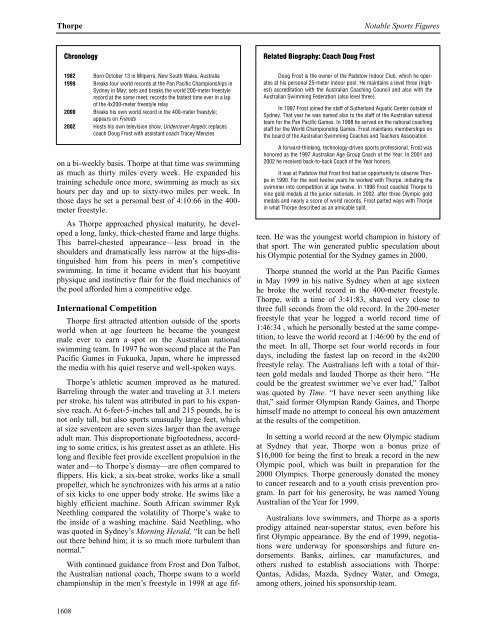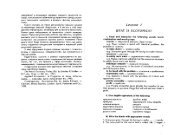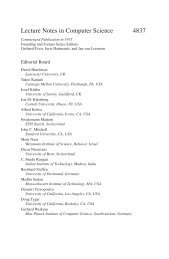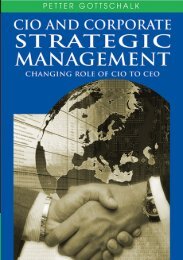Frank Thomas
Frank Thomas
Frank Thomas
You also want an ePaper? Increase the reach of your titles
YUMPU automatically turns print PDFs into web optimized ePapers that Google loves.
Thorpe Notable Sports Figures<br />
Chronology<br />
1982 Born October 13 in Milperra, New South Wales, Australia<br />
1999 Breaks four world records at the Pan Pacific Championships in<br />
Sydney in May; sets and breaks the world 200-meter freestyle<br />
record at the same meet; records the fastest time ever in a lap<br />
of the 4x200-meter freestyle relay<br />
2000 Breaks his own world record in the 400-meter freestyle;<br />
appears on Friends<br />
2002 Hosts his own television show, Undercover Angels; replaces<br />
coach Doug Frost with assistant coach Tracey Menzies<br />
on a bi-weekly basis. Thorpe at that time was swimming<br />
as much as thirty miles every week. He expanded his<br />
training schedule once more, swimming as much as six<br />
hours per day and up to sixty-two miles per week. In<br />
those days he set a personal best of 4:10:66 in the 400meter<br />
freestyle.<br />
As Thorpe approached physical maturity, he developed<br />
a long, lanky, thick-chested frame and large thighs.<br />
This barrel-chested appearance—less broad in the<br />
shoulders and dramatically less narrow at the hips-distinguished<br />
him from his peers in men’s competitive<br />
swimming. In time it became evident that his buoyant<br />
physique and instinctive flair for the fluid mechanics of<br />
the pool afforded him a competitive edge.<br />
International Competition<br />
Thorpe first attracted attention outside of the sports<br />
world when at age fourteen he became the youngest<br />
male ever to earn a spot on the Australian national<br />
swimming team. In 1997 he won second place at the Pan<br />
Pacific Games in Fukuoka, Japan, where he impressed<br />
the media with his quiet reserve and well-spoken ways.<br />
Thorpe’s athletic acumen improved as he matured.<br />
Barreling through the water and traveling at 3.1 meters<br />
per stroke, his talent was attributed in part to his expansive<br />
reach. At 6-feet-5-inches tall and 215 pounds, he is<br />
not only tall, but also sports unusually large feet, which<br />
at size seventeen are seven sizes larger than the average<br />
adult man. This disproportionate bigfootedness, according<br />
to some critics, is his greatest asset as an athlete. His<br />
long and flexible feet provide excellent propulsion in the<br />
water and—to Thorpe’s dismay—are often compared to<br />
flippers. His kick, a six-beat stroke, works like a small<br />
propeller, which he synchronizes with his arms at a ratio<br />
of six kicks to one upper body stroke. He swims like a<br />
highly efficient machine. South African swimmer Ryk<br />
Neethling compared the volatility of Thorpe’s wake to<br />
the inside of a washing machine. Said Neethling, who<br />
was quoted in Sydney’s Morning Herald, “It can be hell<br />
out there behind him; it is so much more turbulent than<br />
normal.”<br />
With continued guidance from Frost and Don Talbot,<br />
the Australian national coach, Thorpe swam to a world<br />
championship in the men’s freestyle in 1998 at age fif-<br />
1608<br />
Related Biography: Coach Doug Frost<br />
Doug Frost is the owner of the Padstow Indoor Club, which he operates<br />
at his personal 25-meter indoor pool. He maintains a level three (highest)<br />
accreditation with the Australian Coaching Council and also with the<br />
Australian Swimming Federation (also level three).<br />
In 1997 Frost joined the staff of Sutherland Aquatic Center outside of<br />
Sydney. That year he was named also to the staff of the Australian national<br />
team for the Pan Pacific Games. In 1998 he served on the national coaching<br />
staff for the World Championship Games. Frost maintains memberships on<br />
the board of the Australian Swimming Coaches and Teachers Association.<br />
A forward-thinking, technology-driven sports professional, Frost was<br />
honored as the 1997 Australian Age Group Coach of the Year. In 2001 and<br />
2002 he received back-to-back Coach of the Year honors.<br />
It was at Padstow that Frost first had an opportunity to observe Thorpe<br />
in 1990. For the next twelve years he worked with Thorpe, initiating the<br />
swimmer into competition at age twelve. In 1996 Frost coached Thorpe to<br />
nine gold medals at the junior nationals. In 2002, after three Olympic gold<br />
medals and nearly a score of world records, Frost parted ways with Thorpe<br />
in what Thorpe described as an amicable split.<br />
teen. He was the youngest world champion in history of<br />
that sport. The win generated public speculation about<br />
his Olympic potential for the Sydney games in 2000.<br />
Thorpe stunned the world at the Pan Pacific Games<br />
in May 1999 in his native Sydney when at age sixteen<br />
he broke the world record in the 400-meter freestyle.<br />
Thorpe, with a time of 3:41:83, shaved very close to<br />
three full seconds from the old record. In the 200-meter<br />
freestyle that year he logged a world record time of<br />
1:46:34 , which he personally bested at the same competition,<br />
to leave the world record at 1:46:00 by the end of<br />
the meet. In all, Thorpe set four world records in four<br />
days, including the fastest lap on record in the 4x200<br />
freestyle relay. The Australians left with a total of thirteen<br />
gold medals and lauded Thorpe as their hero. “He<br />
could be the greatest swimmer we’ve ever had,” Talbot<br />
was quoted by Time. “I have never seen anything like<br />
that,” said former Olympian Randy Gaines, and Thorpe<br />
himself made no attempt to conceal his own amazement<br />
at the results of the competition.<br />
In setting a world record at the new Olympic stadium<br />
at Sydney that year, Thorpe won a bonus prize of<br />
$16,000 for being the first to break a record in the new<br />
Olympic pool, which was built in preparation for the<br />
2000 Olympics. Thorpe generously donated the money<br />
to cancer research and to a youth crisis prevention program.<br />
In part for his generosity, he was named Young<br />
Australian of the Year for 1999.<br />
Australians love swimmers, and Thorpe as a sports<br />
prodigy attained near-superstar status, even before his<br />
first Olympic appearance. By the end of 1999, negotiations<br />
were underway for sponsorships and future endorsements.<br />
Banks, airlines, car manufactures, and<br />
others rushed to establish associations with Thorpe:<br />
Qantas, Adidas, Mazda, Sydney Water, and Omega,<br />
among others, joined his sponsorship team.

















